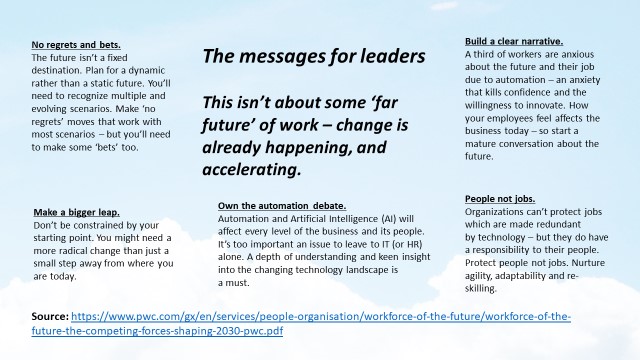Reskilling, career pathing, talent development – all of these concepts are important to me both personally and professionally.
Too often, I see people plateau in their careers because they have not dedicated themselves to learning new skills, becoming fluent in new technologies, and having an understanding of what is trending and necessary for their industry and their profession.
Even worse, my heart aches when I meet these same people, but they are now in transition – when they pay the price for not investing in career development and are now struggling to find new employment opportunities.
Continuous learning and focused career pathing are essential to job security, advancement, and your future.
Last week, Cornerstone OnDemand released a workforce trends report Building an Adaptive Workforce: The Demand for Transparency and Skills Development.
The report brought home the importance of career development. The Cornerstone study revealed:
- 53% of the respondents are not sure they have the skills to withstand a future layoff.
- 83% believe it is essential to improve professional skills.
- 60% of boomers feel insecure about their current skill sets.
- 53% of millennials say their employers help them identify the skills they need, while only 37% of boomers agree.
- 50% of people believe their current employers provide the right development opportunities to help them be successful, but they report a lack of transparency from their employers around job-critical skills and internal mobility, with older generations receiving the least amount of support related to their careers.
- 73% of the baby boomer generation finds their employers uninterested in helping them identify the skills they need to be successful.
What this tells me is:
- Almost everyone recognizes the importance of career development.
- Too many people (for me, at least) are not doing anything to update their skill set.
- Even worse, they are expecting that their employer should be taking care of this for them.
The Cornerstone report states:
People need to continuously adapt and learn new skills to stay ahead of change, prevent displacement, and prepare themselves as well as their companies for future opportunities.
According to PwC's " Workplace of the future: The competing forces shaping 2030" report, today's workforce possesses the drive to learn high-demand skills, although there is less clarity on a career direction.
The PwC report mentioned above has some sage advice for leaders on how they can help develop their workforce:

The PwC message to leaders is encouraging because it places responsibility on both leadership and their employees. Waiting for the other to act on your behalf will be a fast-lane ticket to obsolescence.
Going back to the Cornerstone study:
- Over 50% of those who experienced a layoff believe engaging in new skills development could prevent a future layoff.
- 64% believe development contributes to their likelihood of promotion.
- 76% of participants agree that learning new skills makes them feel more confident at work, which in turn results in improved performance.
- 50% of respondents see the ability to complete tasks beyond the immediate job assignment as key for promotion.
- Older generations (60%) believe skill diversification is more critical than do younger workers (39%), and female respondents noted they value a diversified skillset (59%) more than they value a good relationship with their manager (26%).
In summary, the future is going to be dynamic and ever-changing. To succeed, everyone will need to embrace a continual learning mindset. Forward-thinking organizations are taking innovative steps in the area of career pathing and reskilling their employees.
That said, no one can passively approach career development with the expectation that their employer will assist. Everyone will have to personally invest in their development – whether it is taking full advantage of any employer-provided service or creating their learning path.




